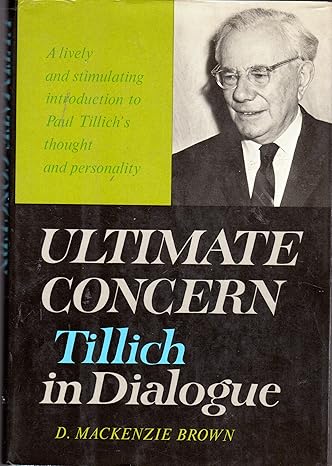Shopping Cart
-
${ item.product_title }$ ${item.price}


People are viewing this right now
"Ultimate Concern: Tillich in Dialogue" by D. Mackenzie Brown is a scholarly work that engages deeply with the theological ideas of Paul Tillich, particularly focusing on Tillich's concept of "ultimate concern." The book explores Tillich's thought in relation to contemporary issues and dialogues, offering insights into how Tillich's ideas can be understood and applied in a modern context. It's a valuable resource for anyone studying Tillich's theology or interested in existential and theological questions about ultimate meaning and concern.
Paul Tillich (1886-1965) was a German-American theologian and philosopher who is widely considered one of the most influential theologians of the 20th century. He was born in Germany and later emigrated to the United States due to his opposition to the Nazi regime. Tillich's theological work is known for its depth and breadth, integrating existentialist philosophy with Christian theology.
1. **Method of Correlation**: Tillich's approach to theology involved correlating existential questions and human experiences with Christian symbols and doctrines. This method aimed to make theology relevant to contemporary issues and the existential concerns of individuals.
2. **Dynamics of Faith**: He explored the dynamics of faith in terms of its existential dimensions, emphasizing faith as an ultimate concern that gives meaning and purpose to human existence.
3. **Systematic Theology**: Tillich's major work, "Systematic Theology," presents a comprehensive framework for understanding Christian doctrine in relation to existential questions about human existence, meaning, and the divine.
4. **Cultural and Social Critique**: Tillich also engaged in cultural critique, addressing issues such as alienation, meaninglessness, and the impact of technological society on human spirituality.
5. **Influence**: His ideas have influenced not only theology but also fields such as psychology, literature, and philosophy. Tillich's emphasis on the existential dimension of faith and his innovative theological method continues to provoke scholarly interest and debate.
Overall, Paul Tillich's work represents a significant contribution to theological thought, particularly in terms of bridging existential concerns with traditional Christian doctrine and symbols.